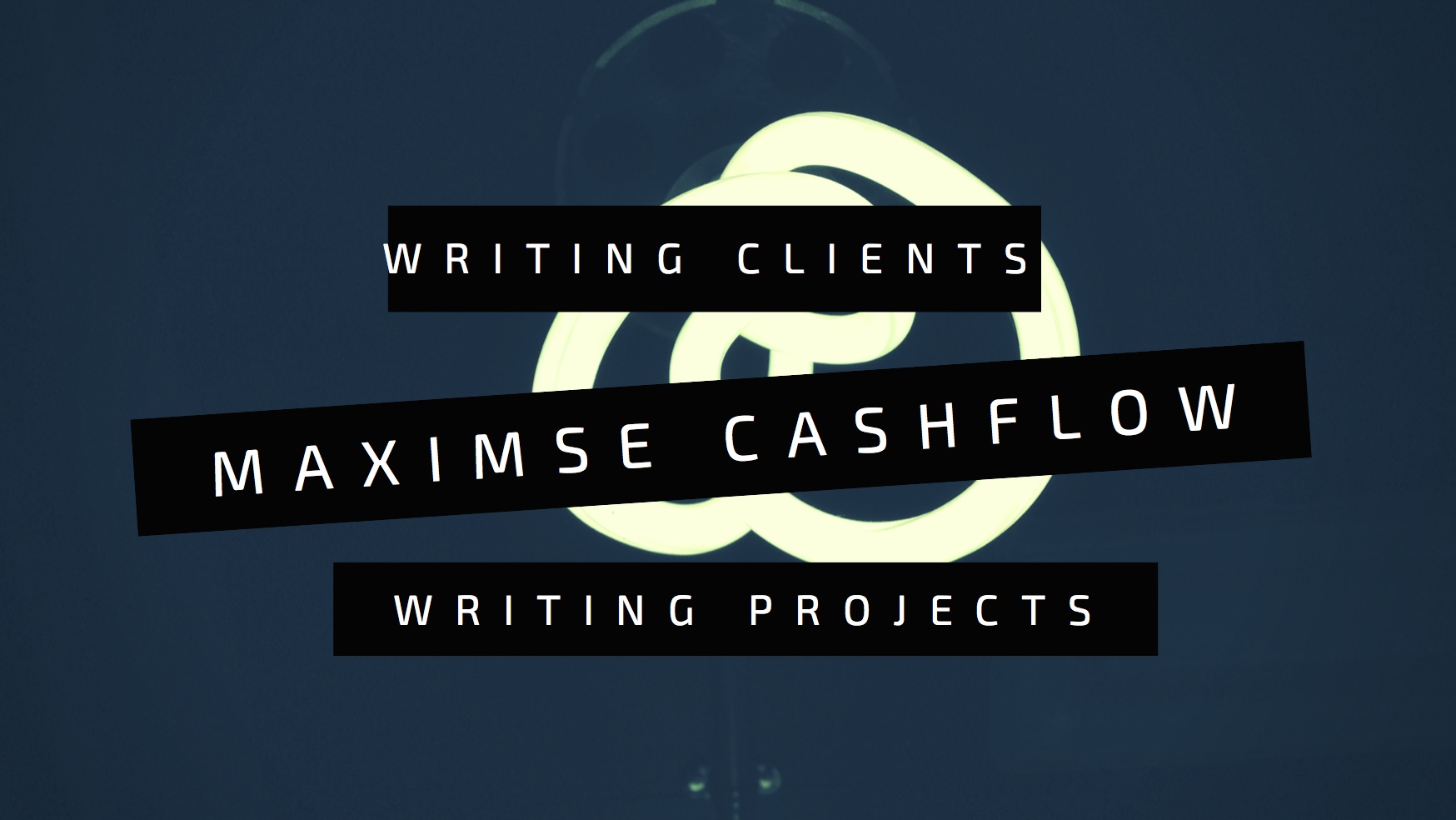Your cart is currently empty!

Maximise Cashflow: balancing your writing projects and freelance writing clients
To maximise cashflow it’s essential to plan and balance long-term writing projects with your writing clients and short-term projects.
Making writing your profession can be very challenging for cashflow. Most of us writers are self-employed in sole trader-styled small businesses, where we do all of the billable work ourselves. Even when we reach a point where we can hire some help, our assistants can really only help with administrative stuff. If we get sick or want holidays and extra reading time we sacrifice our billable hours, reducing our income and profitability.
To maximise cashflow it’s essential to plan and balance long-term writing projects with your writing clients and short-term projects. You need to be very strategic about any new writing work you take on otherwise you might find yourself unable to sustain your income and keep your bottom line above the bills.
Looking at the big picture it’s all about how you manage your time so you are always working on a mix of short-term projects that pay immediately on completion (like writing blogs and articles), mid-range projects that pay in advance or in milestones (like the content for a full website) and then large projects that yield long term passive income (like writing books and content for courses). Let’s look at each of these areas briefly to give you an idea of how strategic you must be to really make money writing.

Short term writing projects
Short term writing projects are a bit like coffee, they give you a quick financial hit and then it’s over. You can make money as a writer delivering on short term jobs like:-
- One-off blogs and articles
- Linkedin Profiles
- Resumes, CVs and Job Applications
- Short poems and flash fiction
- Copywriting landing pages or company profiles
- Content for websites
And they’re an important part of a writer’s income stream. But unless you’re dealing with an existing client, short-term projects can take up loads of your time (possibly a lot more than you are billing them). It takes time to build relationships with clients or to pitch new publications as you need to learn about their businesses, their client base, and their readers.
When you first start your writing business, unless you have existing relationships in place you’ll find yourself spending a huge percentage of your time chasing new clients, writing proposals and pitching new publications. It’s very easy to become caught up in that process only, where you aren’t investing any of your time in longer term writing projects that can deliver a more sustainable income.

Regular Writing Gigs
When you get your business to the next stage (where you have a regular client base) you can relax at little bit. But only for a few minutes. You always want to be seeking regular writing gigs so you can just get on with the writing without having to pitch and fight for every job. Stuff like:-
- Writing a weekly or monthly eNewsletter
- Managing a client’s social media posts
- Regular updates to a website
- Regular blogging for a client
- Editing an online eZine or journal

Technical Writing Projects
Technical writing in the right niche can pay really well for creating things like user manuals, training workbooks, employee handbooks, reference guides, warning labels, product catalogues, customer service policies or FAQs.
Technical writers are paid to take complex subjects and write them into clear, easy understand text. Your best strategy is finding a niche in a specific industry or job role so your research time is minimised and you build on your knowledge with each writing assignment.

Passive Income For Writers
Investing your writing time to create saleable products that generate passive income is something every writer should to strive to achieve. Of course this takes up large chunks of your time and the returns don’t happen until after the product is completely finished (and published). But the rewards manifest as ongoing royalties, subscription fees, and commission payments.
The other great thing about passive income for writers is once you’ve written the materials you can delegate the marketing (if you have the resources of course) to administration staff or a VA working remotely.
Over the coming weeks I’ll be blogging about each of these topics separately, but for now I’ll leave you with a brief overview to give you some ideas.
Self-publishing books
Naturally every writer aspires to have their books published but unless you can attract a publisher to print and market your books you’ll be relying on your own efforts as a self-publisher. Many writers find success self-publishing eBooks in the non-fiction market, writing in a specialised niche. Others self-publish fiction and use a whole host of tactics to get their work out to the reading public. A great example is Andy Weir (bestselling author of ‘The Martian’) who first published that book chapter by chapter on his personal blog.
Writing workshops and courses
Creating your own writing workshops, webinars and online courses is becoming an increasingly popular side-hustle. Websites like Udemy and Teachable enable individuals like you and me to create professional online training courses in our unique area of expertise.
Affiliate sales
Affiliate marketing is a popular business model for making money from websites and blogs. As a writer you can sign up for an affiliate account with online retailers (Amazon.com is a great example) and embed personalised links to their products on your website pages and posts. Every time a reader clicks a link and buys a product within a certain timeframe (say 60 days) you receive a commission. Sounds easy hey?
One thing I don’t really like about affiliate marketing is very often it’s done covertly in posts like “10 Essential Books for Writers”. The writer probably hasn’t read any of the books and they’re convincing readers to buy stuff based on the profile of their blog rather than the what’s in the best interest of their readers.
I include affiliate links in some of my posts here on the blog but only for products I’ve personally used and books I’ve actually read. It can be a great way to monetize your website, provided it’s done ethically and transparently.
Pay-per-click advertising
We’ve all seen the annoying banner ads and pop-up boxes that flood our eyes when visiting news websites, blogs and social media sites. YouTube is a glaring example. Annoying the user but a revenue stream for the website or blog owner.
You sign up and register for an advertising account with companies like Google or WordPress and receive a commission every time a reader clicks on an ad. Sounds simple enough but you need a huge volume of visitors to make money. The guys over at AuthorityHacker (who live and breathe monetising websites) say you need at least 1,000 unique visitors per day before bothering.
Similarly YouTube has significantly increased the minimum amount of subscribers and view-hours required before they offer advertising rebates. For me (at the time of writing this post) the visual quality and aesthetics of my blog are more important than display ads. Perhaps I’ll change my mind in the future, but for the foreseeable future at least there won’t be ads on this website.
Be realistic and remember your reputation
The concept of passive income is excellent but the ‘set-and-forget’ business model that gets touted around the make-money-quick websites and lead pages is far from realistic. Of course you should write great materials but there is still a lot of work to be done in the marketing as well as keeping the books, course materials and workshops up-to-date.
My final point on passive income and affiliate marketing is to remember your professional reputation. Use integrity and be honest when promoting affiliate products or writing training courses and workshops. Make sure they add value to your readers and strengthen your professional reputation.

Managing Your Writing Time
When you’re a writer and small business owner, your ability to manage your time is just as important as your ability to write. Though sometimes I think time management and personal productivity is such a fundamental part of writing that it cannot be separated. You must manage your time in order to finish the novel or get that client’s website copy finished.
Use a strategic approach to securing clients by seeking a range of short-term and long term writing assignments as well as committing to the ongoing development of your own personal writing projects (like books and courses). Write with integrity and promote affiliate products that have genuinely benefited you, and you can enjoy long term success in your writing business and regular, consistent cash flow.
© 2018 Melinda J. Irvine. Images: Canva.
- Daily Post: Above
- I’m part of Post A Day 2018
Discover more from Melinda J. Irvine
Subscribe to get the latest posts to your email.





2 responses to “Maximise Cashflow: balancing your writing projects and freelance writing clients”
Hi I’m najah I have a very good idea about a book which can become a Hollywood movie, it talks about history music war passion and love.
I need someone to help me out , so I can finish it
I’m not English educated maybe one of the reasons I couldn’t finish it
hi Najah, thanks for your message. just keep working at your book (even if it’s only one page per day) and you will finish it eventually. mel.